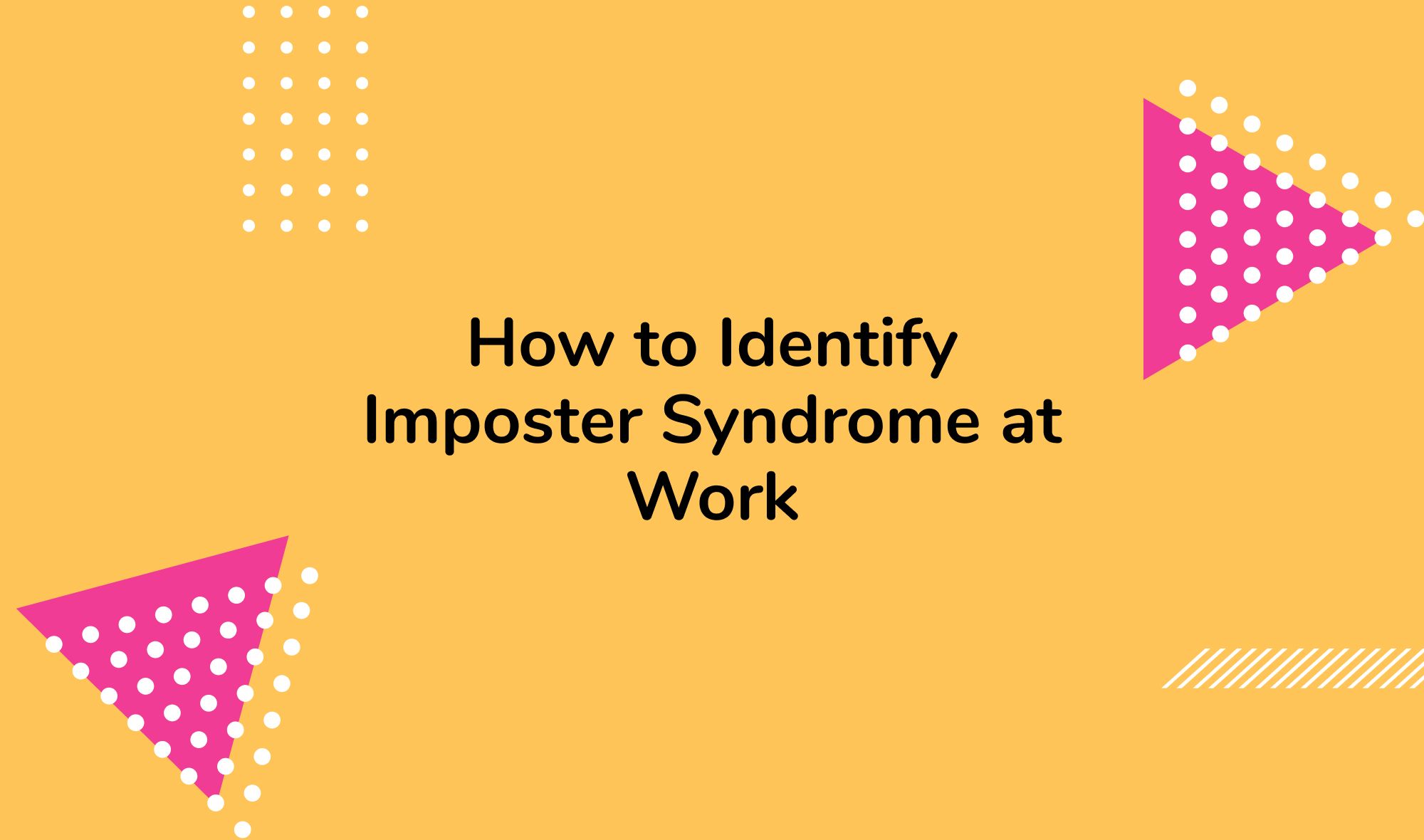Imposter Syndrome at Work: Identifying and Overcoming Self-Doubt
By Julian Lewis • June 20, 2023
Key Takeaways
- Imposter syndrome is a common phenomenon that can affect anyone, especially in a new job or high-stress environment.
- Self-doubt is a major contributor to feeling like a fraud at work.
- Identifying imposter syndrome involves recognizing symptoms, self-assessment, and learning from others' experiences.
- Overcoming imposter syndrome requires adopting a growth mindset, professional coaching, self-advocacy, and supportive management.
- There are numerous resources, including books and professional guidance, to help individuals deal with imposter syndrome.

Has this ever happened to you? You land that new job you've been dreaming about. You're thrilled, you're energized, but then a tiny, insidious thought creeps in: "Am I really qualified for this?" If this sounds familiar, you're not alone. Many high achievers, particularly high achieving women, experience imposter syndrome - a psychological phenomenon that can turn success into a constant fear of being exposed as a fraud.
In this comprehensive guide, we will delve into understanding and overcoming imposter syndrome at work. We will explore its origin, signs, and the various types that can be found. We'll share stories of successful people who experience imposter syndrome, and we'll provide research-backed strategies to help you combat impostor syndrome, and reclaim your confidence and self-esteem.
Stick around till the end, because we'll reveal some surprising research findings about imposter syndrome and give you practical, actionable advice from career coaches to help you conquer this challenging mental health issue.
Ready to free yourself from the paralyzing grip of imposter syndrome? Read on!
For more on this topic, check out:
Join our Newsletter
Transform your career with our personal growth insights. Get one valuable tip right in your inbox every Saturday morning.
Understanding Imposter Syndrome at Work
Imposter Syndrome, also known as the Imposter Phenomenon, is not an official diagnosis but is widely recognized as a very real and specific form of self-doubt. It can lead to significant stress, anxiety, and low self-esteem, affecting one's performance in the workplace.
Symptoms of Imposter Syndrome in the Workplace
Imposter syndrome shows itself in a variety of ways, but some common signs include:
- Fear of being exposed as a fraud
- Self-doubt and negative thoughts
- Believing you're not as capable or intelligent as others perceive you to be
- Attributing success to luck or external factors
- Fear of failure or making mistakes
Do these signs of imposter syndrome sound familiar? If so, you might be experiencing imposter syndrome at work.
Recognizing Signs of Imposter Syndrome at Work
How a New Job Can Trigger Imposter Syndrome
Starting a new job is exciting, but it can also be a prime trigger for imposter syndrome. As you face new tasks and challenges, it's natural to feel a bit out of your depth. However, if you continually feel like you're not qualified—despite positive feedback and success—that's imposter syndrome at work. This is particularly common among high achievers and successful women.
How to Navigate the First Few Months of a New Job
The Impact of Imposter Syndrome on Work Performance
Imposter syndrome can negatively impact work performance, employee engagement, and overall job satisfaction. It can create a constant fear of failure, leading to over-preparation or procrastination. Moreover, it can prevent you from fully acknowledging and celebrating your work accomplishments, thus holding you back from reaching your full potential.
If you think imposter syndrome is negatively impacting your work performance, you're not alone—and there are strategies to combat it.
Overcoming Imposter Syndrome for Better Job Performance
Recognizing and understanding imposter syndrome are the first steps to overcoming it. In the following sections, we'll delve into how you can manage and overcome imposter syndrome at work.
Self-Doubt: The Underlying Force Behind Imposter Syndrome

Imposter syndrome and self-doubt are closely intertwined. Understanding this relationship can shed light on why you may be feeling like a fraud at work and provide pathways to overcome it.
The Link Between Imposter Syndrome and Self-Doubt
At the heart of imposter syndrome lies self-doubt. It's that little voice in your head that whispers you're not good enough, not smart enough, not skilled enough. These negative thoughts are characteristic of imposter syndrome and form the core of why individuals feel like impostors.
Self-doubt accompanies success, and it's paradoxically common among high achieving people and successful women who have made considerable strides in their careers. Yet, despite their achievements, they harbor a fear of being found out as a fraud.
In essence, self-doubt serves as the fuel for imposter syndrome, leading individuals to discount their accomplishments and live in constant fear of being exposed as an 'impostor.'
Understanding the Connection Between Self-Doubt and Imposter Syndrome
The Role of Self-Doubt in Feeling Like a Fraud at Work
When self-doubt takes hold, it can dramatically skew your perception of your skills and abilities. This is especially true in the workplace, where pressure and expectations are high. You may feel guilty about your success or worry that you've only gotten where you are due to luck or deception.
Anxiety can often be a byproduct of feeling like an impostor at work. Check out our post on How to Calm Anxiety at Work for some helpful tips. In reality, it's not that you are unqualified or incapable, but the self-doubt planted by imposter syndrome makes it seem that way. It's important to remember that these feelings of self-doubt are not a reflection of your true abilities or accomplishments.
Recognizing this dynamic can be a powerful first step in combating imposter syndrome at work. In the next section, we'll explore research-backed strategies for doing just that.
Banishing Self-Doubt to Overcome Imposter Syndrome at Work
Case Studies: Imposter Syndrome at Work

Sometimes, hearing the experiences of others can make us feel less alone. It's comforting to know that many of us are dealing with imposter syndrome at work. Here are a couple of real-life examples showcasing how even highly successful individuals grapple with this psychological phenomenon.
Case Study 1: Michelle Obama and the Persistent Fear of Not Belonging
Despite her tremendous success, former First Lady Michelle Obama is no stranger to imposter syndrome. She once stated, "I still sometimes feel like a fraud. It doesn't go away, that feeling that you shouldn't take me that seriously." Here is an inspiring figure who has made significant strides in her career, yet she, too, has felt like an imposter.
Her story underscores that imposter syndrome doesn't discriminate – it can affect anyone, irrespective of their level of success. It's an important reminder that feelings of self-doubt aren't a reflection of your capabilities but of the impostor phenomenon that so many of us experience.
Listen to Michelle Obama's Experience of Imposter Syndrome
Join our Newsletter
Transform your career with our personal growth insights. Get one valuable tip right in your inbox every Saturday morning.
Case Study 2: High Achievers and the Fear of Being Found Out
On the Amazing If podcast, several high achievers share their experiences dealing with imposter syndrome at work. One common theme among these individuals is the fear of being 'found out.'
Despite their accomplishments, they experience a persistent worry that they're not as competent as others perceive them to be. These fears often lead to over-preparation and an inability to accept positive feedback, further fueling their imposter feelings. Hearing these stories can be incredibly helpful in realizing that you're not alone in these experiences.
Dealing with imposter syndrome at work is a shared experience among many. Learning from these stories, we can gather insights to better understand and combat our own feelings of being an imposter.
Discover Real-Life Experiences of Dealing with Imposter Syndrome at Work
How to Identify Imposter Syndrome at Work

Imposter syndrome is a widespread psychological phenomenon that affects many people, especially those in the workplace. But how can you tell if you're experiencing it? Recognizing the signs of imposter syndrome and using self-assessment can be invaluable in identifying this common issue.
Key Signs of Impostor Syndrome at Work
Here are some common signs of imposter syndrome you might observe at work:
- Persistent self-doubt: Despite your accomplishments and skills, you might continually doubt your abilities. This self-doubt often accompanies success, creating a jarring contrast between how you perceive yourself and your actual achievements.
- Attributing success to external factors: You might attribute your successes to luck or believe that others have overestimated your abilities, rather than attributing them to your skills or hard work.
- Fear of being exposed as a 'fraud': A common symptom is the fear that your co-workers will eventually discover that you're not as competent as they initially thought. This fear can be pervasive and negatively impact your work performance and mental health.
Learn More About Impostor Syndrome at Work
Using Self-Assessment to Identify Feelings of Being an Imposter at Work
Self-assessment can be a powerful tool for identifying feelings of being an imposter. This process involves reflecting on your feelings, thoughts, and behaviors related to your job and achievements. For deeper introspection, consider these 45 Self-Reflection Questions to Nurture Your Mind, Body, and Soul.
You might ask yourself the following questions:
- Do I often feel like I'm not as competent or intelligent as others perceive me to be?
- Do I struggle to accept praise or positive feedback, instead feeling like I've somehow 'tricked' others into thinking I'm capable?
- Do I over-prepare for tasks or projects out of fear of making a mistake?
If you answered 'yes' to most of these questions, you might be dealing with imposter syndrome. Recognizing this is the first step towards overcoming it.
Discover Ways to Identify Feeling Like an Imposter at Work
Identifying the signs of imposter syndrome can help you better understand your feelings and take steps towards combating it. Remember, it's a common experience, and there are resources and strategies available to help you navigate these feelings in your professional life.
Overcoming Imposter Syndrome: Practical Steps

Feeling like an imposter in your job is a common experience, particularly among high-achievers. However, it's crucial to remember that overcoming imposter syndrome is possible, and there are practical steps you can take. These include various techniques such as self-advocacy, seeking professional coaching, and implementing strategies to mitigate the feelings of self-doubt.
Techniques for Dealing With Imposter Syndrome at Work
- Self-awareness: Recognize and acknowledge the feelings of self-doubt and understand that they're a part of the imposter syndrome phenomenon. Recognizing the issue is the first step towards combating it.
- Positive Self-Talk: Change your narrative by challenging negative thoughts and replacing them with more positive and self-affirming statements. This shift can help boost self-confidence and reduce feelings of fraudulence.
- Seek Support: Having a support network can make a world of difference. Share your feelings with trusted co-workers, friends, or family members. You'll often find that you're not alone in these experiences.
- Celebrate Successes: Don't brush off your achievements as luck or timing. Make it a habit to acknowledge your successes and attribute them to your skill set and hard work.
If you're struggling with impostor syndrome, consider seeking out a mentor who can provide guidance and support. Learn more about the benefits of mentoring in our blog post: "Setting the Record Straight: Which of the Following Statements About Mentoring Is True?".
Discover More Techniques on How to Deal with Imposter Syndrome at Work.
The Role of Professional Coaching in Overcoming Imposter Syndrome
Career coaches are trained to help individuals recognize and overcome self-doubt and imposter syndrome. They can provide you with research-backed strategies and tools to combat impostor syndrome effectively, tailored to your unique experiences and circumstances. A career coach can also assist you in creating psychological safety in your workplace environment, which is crucial in dealing with imposter syndrome.
Learn More About Business Coaching
The Power of Self-Advocacy in Combating Imposter Syndrome
Self-advocacy is a powerful tool in combating imposter syndrome. Advocating for yourself in the workplace means recognizing your worth and communicating your needs and accomplishments effectively. It's about shifting your mindset from feeling like an impostor to recognizing your value and expressing it openly. It can help you get a clearer sense of your capabilities and reduce feelings of being a fraud.
Learn How to Start Advocating for Yourself in the Workplace
Overcoming imposter syndrome is not a one-size-fits-all process. It's about discovering what works best for you, which could be a combination of self-awareness, positive self-talk, seeking support, celebrating your successes, professional coaching, and strong self-advocacy. Remember, everyone experiences self-doubt at times, and it's okay to seek help when you need it.
Role of Management in Addressing Imposter Syndrome

Leadership plays a critical role in the way imposter syndrome manifests in the workplace. An understanding and supportive manager can create an environment that helps to mitigate feelings of self-doubt and promote the psychological safety necessary to address these concerns. Here's how managers can help employees overcome imposter syndrome and how a supportive culture can counter work imposter syndrome.
How Managers Can Help Employees Overcome Imposter Syndrome
Managers can take proactive measures to help their employees combat imposter syndrome. They can:
- Normalize the Discussion About Imposter Syndrome: By openly discussing imposter syndrome, managers can foster an environment where employees feel safe sharing their experiences and feelings. This conversation can make employees realize they're not alone in their experience.
- Provide Regular, Constructive Feedback: Regularly providing employees with positive and constructive feedback can help them gain a clear sense of their capabilities and diminish feelings of self-doubt.
- Promote a Growth Mindset: By fostering a culture that values learning and growth over perfection, managers can help reduce the fear of making mistakes that often feeds into imposter syndrome.
- Offer Support and Resources: Managers can provide resources such as workshops, coaching, or mental health support to help employees deal with feelings of self-doubt and impostor syndrome.
Learn More About How to Become a Good Manager
Implementing a Supportive Culture to Counter Work Imposter Syndrome
A supportive and understanding workplace culture is key to helping employees navigate the challenges of imposter syndrome. Positive workplace practices include:
- Creating Psychological Safety: A safe space where employees feel they can express their thoughts and fears without being judged or punished can help mitigate feelings of self-doubt and impostor syndrome.
- Encouraging Collaboration: Collaboration encourages the exchange of ideas and experiences, helping employees realize that they are not alone in their feelings and that everyone can learn from each other.
- Rewarding Effort, Not Just Success: By recognizing the value of effort and process, rather than just the end result, organizations can help employees feel less pressure to be perfect and reduce the occurrence of imposter syndrome.
Learn How to Identify and Correct Negative Workplace Culture
By understanding imposter syndrome and actively working to combat its effects, managers can foster a more positive and productive work environment. It is essential to remember that overcoming imposter syndrome is a continuous journey, not a destination, and ongoing support and understanding from management are crucial for success.
The Journey to Overcome Imposter Syndrome

Overcoming imposter syndrome is a journey that involves self-reflection, a shift in mindset, and continuous learning. Individuals may find various strategies helpful in their journey to combat imposter syndrome, from adopting a growth mindset to using personal coaching and reading insightful books. Here's a look at how to overcome imposter syndrome and combat the feelings associated with this psychological phenomenon.
Adopting a Growth Mindset to Overcome Imposter Syndrome
A growth mindset—the belief that our abilities and intelligence can be developed with effort, learning, and persistence—can be a powerful weapon against imposter syndrome. When we embrace the idea that challenges are opportunities to grow, we become more resilient in the face of setbacks and less likely to internalize failure. Instead of viewing ourselves as "frauds" for not knowing or succeeding immediately, we understand that growth comes from continual learning and effort.
Using Personal Coaching to Fight Imposter Syndrome at Work
Personal coaching is another powerful tool in overcoming the feeling of being an imposter at work. A coach can provide strategies to identify and confront negative self-talk, foster a healthier self-image, and guide you towards acknowledging and accepting your achievements. They can help build your self-confidence, giving you the tools to combat imposter syndrome effectively.
Discover More About Personal Coaching
Books that Help in Overcoming Imposter Syndrome
An array of insightful books can provide guidance and understanding for those experiencing imposter syndrome. These books delve into the heart of the issue, provide personal accounts, and offer practical solutions to overcome imposter syndrome.
- "The Impostor Phenomenon: Overcoming the Fear that Haunts Your Success" by Pauline Rose Clance and Suzanne Imes offers an in-depth understanding of this psychological pattern and presents a comprehensive plan to overcome it.
- "The Secret Thoughts of Successful Women: Why Capable People Suffer from the Impostor Syndrome and How to Thrive in Spite of It" by Valerie Young provides invaluable insights into the feelings of self-doubt and inadequacy that many high-achieving women experience.
- "Own Your Greatness: Overcome Impostor Syndrome, Beat Self-Doubt, and Succeed in Life" by Lisa Orbe-Austin and Richard Orbe-Austin offers strategies for people to recognize and overcome their imposter syndrome and achieve their full potential.
- "The Imposter Cure: How to stop feeling like a fraud and escape the mind-trap of imposter syndrome" by Jessamy Hibberd explores the psychological impact of imposter syndrome and provides practical solutions to deal with it.
- "The Gifts of Imperfection: 10th Anniversary Edition: Features a new forward" by Brené Brown helps readers embrace their imperfections and realize that they are enough as they are, which can help to alleviate feelings of imposter syndrome.
The journey to overcome imposter syndrome is deeply personal and can be challenging, but it is certainly possible.
Conclusion: Overcoming Imposter Syndrome is Possible
Overcoming imposter syndrome at work may seem daunting, but it is entirely possible with the right mindset, support, and strategies. As we've seen throughout this piece, understanding the symptoms, acknowledging self-doubt, learning from others' experiences, identifying the syndrome, taking practical steps, and receiving support from management can all play a crucial role in overcoming imposter syndrome.
Combatting imposter syndrome requires persistent efforts and a firm commitment to building self-confidence and self-efficacy. This may involve fostering a growth mindset, seeking professional coaching, advocating for oneself, creating a support network, and continuous learning.
Addressing and overcoming imposter syndrome is not just important for individual mental health and career progression—it can also contribute to a more positive, inclusive, and productive workplace environment. By shedding light on imposter syndrome and taking steps to address it, we can create a culture that allows individuals to thrive and perform at their best, free from debilitating self-doubt and fear.
References and Further Reading
- The Impostor Syndrome Files Podcast
- Squiggly Careers Podcast
- How to Deal with Imposter Syndrome Blog
- Business Coaching
- Start Advocating for Yourself in the Workplace
- How to Become a Good Manager
- Building a Better Business: How to Identify and Correct Negative Workplace Culture
- Personal Coaching
- Impostor Syndrome and Psychological Characteristics of High School Students
- When Success Makes You Feel Like A Fake
- The Impact of Imposter Syndrome on Health Behaviors
- Contextualizing the Impostor Syndrome
For a deeper understanding of the causes, impacts, and solutions for imposter syndrome, these scientific studies and professional resources provide valuable insight. Knowledge is power, and the more you understand about imposter syndrome, the more equipped you'll be to overcome it.
Read more about: Imposter Syndrome, Self Advocacy, Professional Development, Executive Coaching
About Julian Lewis
Julian Lewis is a driven and accomplished professional with a passion for driving positive change in the business world. He is the co-founder and COO at Zella Life.
His own experience as a professional of color in a Fortune 500 company led him to discover the limitations for advancement that many professionals like himself face. Determined to reach his full potential, Julian became an established business coach and entrepreneur, committed to supporting others in their pursuit of personal and professional growth.
Today, Julian is a recognized corporate trainer, coach, and leader, known for his ability to leverage real-life experiences and evidence-based methodologies to affect positive change within individuals and organizations. As the leader of Zella Life's coaching division, he is dedicated to empowering individuals and businesses to achieve their full potential.